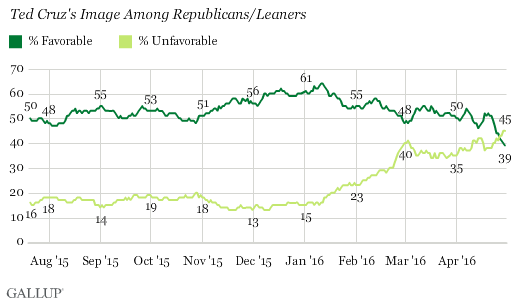
Ted Cruz has dropped out of the presidential race:
Crushed in the Indiana primary he had declared would decide the fate of the Republican presidential campaign, Texas Sen. Ted Cruz on Tuesday night ended his presidential campaign, essentially ceding the nomination to front-runner Donald Trump.
There would have been no point in continuing to campaign after getting blown out tonight, but it is still a little surprising that Cruz would throw in the towel before the last few primaries are over. Cruz has liked to present himself as a stalwart of movement conservatism, and he has routinely mocked his colleagues for belonging to what he called the “surrender caucus” when they didn’t want to do as he wished. In the end, Cruz was just as ready to surrender when presented with a hopeless situation. He will end the 2016 race as the runner-up to Trump, but he has burned so many bridges along the way that it is doubtful that he has much of a chance in four years.
Several months ago, I said that Cruz wouldn’t be the Republican nominee this year. I had underestimated how competitive he would be in the primaries, but I was confident that his habit of making enemies out of potential allies and alienating most of the people he worked with would come back to haunt him. As it turned out, his scorched-earth approach to dealing with people in his own party meant that there were very few willing to endorse him or stick their necks out for him when he needed help. He went much farther in this race than anyone thought he would, but he couldn’t have done much better than he did because he was ultimately nothing more than the factional candidate of a bloc of very conservative and evangelical voters.
There simply weren’t enough of those voters to propel him to victory in most places, and he ended up being no more successful than Rick Santorum was when he challenged Romney. In many ways, he and Santorum are two of a kind: fanatical, earnest, and personally off-putting. Even when you want to agree with them on an issue, something about them makes you look for reasons not to. The traits that make them appealing to a faction of Republicans is what makes everyone else distrust and dislike them. But Cruz somehow managed to make himself even less likable. Cruz was perceived to be a much more calculating and opportunistic politician than Santorum, and that reputation for cynicism and self-serving maneuvering further hurt his cause. Gallup found that Cruz’s favorability with Republicans had turned negative over the last few weeks:
The strange thing here isn’t that Cruz became so unpopular even with Republicans, but that there were ever so many that viewed him favorably. His knack for turning his political allies against him finally caught up with him. The only wonder is that it took this long for most Republicans to realize how awful he was.